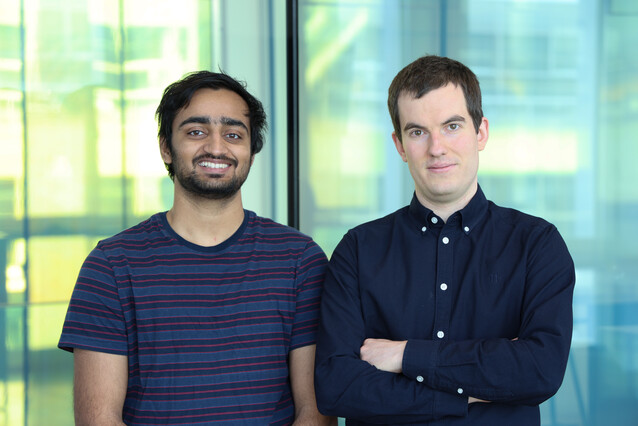BIF fellowship for Sachin Mishra and Max Graf
The Boehringer Ingelheim Fonds (BIF) has awarded prestigious fellowships to Sachin Mishra and Max Graf, PhD students in the labs of Alexander Stark and Clemens Plaschka respectively. The fellowships will support their PhD projects on cofactor recruitment in gene regulation and the coupling of transcription and RNA splicing.
Sachin Mishra and Max Graf joined the IMP in June 2024 through the Vienna BioCenter PhD Program, becoming members of the labs of Alexander Stark and Clemens Plaschka respectively. Both were now awarded competitive fellowships from the Boehringer Ingelheim Fonds (BIF), which will support their PhD research.
Understanding cofactors in gene regulation
Gene expression is tightly controlled by specific DNA regions known as cis-regulatory elements. These elements determine when, where, and to what extent a gene is activated. Transcription factors recognise and bind to specific DNA sequences within these elements, initiating or modulating the transcription of target genes. But transcription factors don’t work alone—they often pair up with cofactor proteins. These cofactors are important for gene regulation, but they do not bind to the DNA themselves the way transcription factors do; instead, they are brought to the right places on the DNA through other interactions. Even though cofactors play a key role in gene regulation, scientists don’t fully understand how they are recruited to the correct spots in the genome. The goal of Mishra’s PhD project is to explore this question. Using advanced, large-scale screening methods, Mishra will map the specific regions within cofactor proteins that are responsible for their recruitment to cis-regulatory elements.
Before joining the IMP, Sachin Mishra completed his bachelor’s and master’s at the Indian Institute for Science Education and Research (IISER), Bhopal. For his master’s thesis Mishra worked at the National Centre for Biological Sciences (NCBS) in Bengaluru, where he investigated the mechanisms that activate signalling-responsive regulatory elements.
How cells couple RNA production and processing
Transcription by RNA polymerase II leads to the synthesis of pre-messenger RNAs (pre-mRNAs) which is often coordinated with splicing. This process, known as co-transcriptional splicing, ensures that the non-coding parts of the RNA–introns–are removed efficiently while the pre-mRNA is still being made. Although scientists know that transcription and splicing are connected, the exact molecular details of how they are coordinated are unknown. In his PhD project, Max is using a combination of biochemical techniques and cryo-electron microscopy to study the molecular machines involved in this coupling. His research aims at revealing how cells coordinate transcription and splicing, which is essential for accurate gene expression.
Max Graf studied biochemistry at the University of Tübingen, where he earned both his bachelor’s and master’s degrees. During his master’s, Graf conducted an internship in the Jonas Lab at ETH Zürich, where he used multidisciplinary approaches to study the mechanisms of gene expression regulation and ribonucleoprotein (RNP) assembly. Graf continued exploring gene expression for his master’s thesis in the Plaschka Lab at the IMP, focusing on the export of messenger ribonucleoprotein complexes (mRNPs).
About the BIF PhD Fellowships
The Boehringer Ingelheim Fonds (BIF) awards PhD fellowships of 2 to 3.5 years to outstanding junior scientists worldwide who wish to pursue an ambitious PhD project in basic biomedical research in an internationally leading laboratory.
The peer-review selection process evaluates the applicant's achievements, as well as the scientific quality of the project and host laboratory. The process is highly competitive, with less than 10 percent of applicants receiving a fellowship.
On top of the monthly stipend, the BIF offers fellows seminars, travel allowances, individual and personal support, and access to a worldwide network of fellows and alumni.
Further Reading
